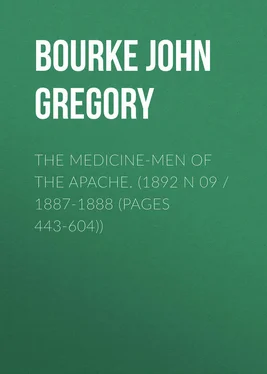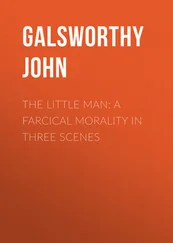John Bourke - The Medicine-Men of the Apache. (1892 N 09 / 1887-1888 (pages 443-604))
Здесь есть возможность читать онлайн «John Bourke - The Medicine-Men of the Apache. (1892 N 09 / 1887-1888 (pages 443-604))» — ознакомительный отрывок электронной книги совершенно бесплатно, а после прочтения отрывка купить полную версию. В некоторых случаях можно слушать аудио, скачать через торрент в формате fb2 и присутствует краткое содержание. Жанр: foreign_antique, foreign_prose, на английском языке. Описание произведения, (предисловие) а так же отзывы посетителей доступны на портале библиотеки ЛибКат.
- Название:The Medicine-Men of the Apache. (1892 N 09 / 1887-1888 (pages 443-604))
- Автор:
- Жанр:
- Год:неизвестен
- ISBN:нет данных
- Рейтинг книги:4 / 5. Голосов: 1
-
Избранное:Добавить в избранное
- Отзывы:
-
Ваша оценка:
- 80
- 1
- 2
- 3
- 4
- 5
The Medicine-Men of the Apache. (1892 N 09 / 1887-1888 (pages 443-604)): краткое содержание, описание и аннотация
Предлагаем к чтению аннотацию, описание, краткое содержание или предисловие (зависит от того, что написал сам автор книги «The Medicine-Men of the Apache. (1892 N 09 / 1887-1888 (pages 443-604))»). Если вы не нашли необходимую информацию о книге — напишите в комментариях, мы постараемся отыскать её.
The Medicine-Men of the Apache. (1892 N 09 / 1887-1888 (pages 443-604)) — читать онлайн ознакомительный отрывок
Ниже представлен текст книги, разбитый по страницам. Система сохранения места последней прочитанной страницы, позволяет с удобством читать онлайн бесплатно книгу «The Medicine-Men of the Apache. (1892 N 09 / 1887-1888 (pages 443-604))», без необходимости каждый раз заново искать на чём Вы остановились. Поставьте закладку, и сможете в любой момент перейти на страницу, на которой закончили чтение.
Интервал:
Закладка:
The warriors of the Plains tribes used to assume agnomens or battle names, and I have known some of them who had enjoyed as many as four or five; but the Apache name once conferred seems to remain through life, except in the case of the medicine-men, who, I have always suspected, change their names upon assuming their profession, much as a professor of learning in China is said to do.
The names of mothers-in-law are never mentioned and it would be highly improper to ask for them by name; neither are the names of the dead, at least not for a long period of time. But it often happens that the child will bear the name of its grandfather or some other relative who was a distinguished warrior.
All charms, idols, talismans, medicine hats, and other sacred regalia should be made, or at least blessed, by the medicine-men. They assume charge of all ceremonial feasts and dances – such as the nubile dance, which occurs when any maiden attains marriageable age, and war dances preceding battle. Nearly all preparations for the warpath are under their control, and when on the trail of the enemy their power is almost supreme. Not a night passes but that the medicine-men get into the "ta-a-chi," or sweat bath, if such a thing be possible, and there remain for some minutes, singing and making "medicine" for the good of the party. After dark they sit around the fire and sing and talk with the spirits and predict the results of the campaign. I have alluded quite fully to these points in a previous work.
When a man is taken sick the medicine-men are in the zenith of their glory. One or two will assume charge of the case, and the clansmen and friends of the patient are called upon to supply the fire and help out in the chorus. On such occasions the Apache use no music except a drum or a rawhide. The drum is nearly always improvised from an iron camp kettle, partially filled with water and covered with a piece of cloth, well soaped and drawn as tight as possible. The drumstick does not terminate in a ball, as with us, but is curved into a circle, and the stroke is not perpendicular to the surface, but is often given from one side to the other. The American Indian's theory of disease is the theory of the Chaldean, the Assyrian, the Hebrew, the Greek, the Roman – all bodily disorders and ailments are attributed to the maleficence of spirits who must be expelled or placated. Where there is only one person sick, the exercises consist of singing and drumming exclusively, but dancing is added in all cases when an epidemic is raging in the tribe. The medicine-men lead off in the singing, to which the assistants reply with a refrain which at times has appeared to me to be antiphonal. Then the chorus is swelled by the voices of the women and larger children and rises and falls with monotonous cadence. Prayers are recited, several of which have been repeated to me and transcribed; but very frequently the words are ejaculatory and confined to such expressions as "ugashe" (go away), and again there is to be noted the same mumbling of incoherent phrases which has been the stock in trade of medicine-men in all ages and places. This use of gibberish was admitted by the medicine-men, who claimed that the words employed and known only to themselves (each individual seemed to have his own vocabulary) were mysteriously effective in dispelling sickness of any kind. Gibberish was believed to be more potential in magic than was language which the practitioner or his dupes could comprehend. In Saxon Leechdoms, compiled by Cockayne, will be seen a text of gibberish to be recited by those wishing to stanch the flow of blood. (See p. 464.)
In the following citations it will be observed that Adair and Catlin were grievously in error in their respective statements. Adair denies that Indians on the warpath or elsewhere depend upon their "augurs" for instruction and guidance. 36 36 American Indians, p. 26.
Gomara is authority for the statement that the natives of Hispaniola never made war without consulting their medicine-men – "no sin respuesta de los ídolos ó sin la de los sacerdotes, que adevinan." 37 37 Gomara, Hist. de las Indias, p. 173.
The medicine-men of Chicora (our present South Carolina) sprinkled the warriors with the juice of a certain herb as they were about to engage in battle. 38 38 "Estos mascan cierta yerba, y con el zumo rocian las soldados estando para dar batalla." Gomara, ibid., p. 179.
In Chicora "Mascaban los Sacerdotes una Ierva, i con el çumo de ella rociaban los Soldados, quando querian dar batalla, que era bendecirlos." 39 39 Herrera, dec. 2, lib. 10, p. 260.
"Among the Abipones [of Paraguay] the medicine-man teaches them the place, time, and manner proper for attacking wild beasts or the enemy." 40 40 Father Dobrizhoffer, quoted by Spencer, Eccles. Institutions, cap. 10, sec. 630.
"The North American Indians are nowhere idolaters." 41 41 Catlin, N. A. Indians, London, 1845, vol. 2, p. 232.
Idols were always carried to war by the natives of Hispaniola: "Atanse á la frente ídolos chiquitos cuando quieren pelear." 42 42 Gomara, op. cit., p. 173.
"Among the primitive Germans * * * the maintenance of discipline in the field as in the council was left in great measure to the priests; they took the auguries and gave the signal for onset." 43 43 Spencer, Eccles. Institutions, cap. 10, pp. 780, 781, quoting Stubb's Constitutional History of England.
"In New Caledonia * * * the priests go to battle, but sit in the distance, fasting and praying for victory." 44 44 Ibid., sec. 630, p. 781, quoting Turner (Geo.), Nineteen Years in Polynesia.
Our hunting songs and war songs may be a survival of the incantations of Celtic or Teutonic medicine-men.
The adoption or retention of obsolete phraseology as a hieratic language which has been noted among many nations of the highest comparative development is a manifestation of the same mental process.
Gibberish was so invariable an accompaniment of the sacred antics of the medicine-men of Mexico that Fray Diego Duran warns his readers that if they see any Indian dancing and singing, "ó diciendo algunas palabras que no son inteligibles, pues es de saber que aquellos representaban Dioses." 45 45 Vol. 3, p. 176. "In every part of the globe fragments of primitive languages are preserved in religious rites." Humboldt, Researches, London, 1814, vol. 1, p. 97. "Et même Jean P. C., Prince de la Mirande, escrit que les mots barbares & non entendus ont plus de puissance en la Magie que ceux qui sont entendus." Picart, vol. 10, p. 45. The medicine-men of Cumana (now the United States of Colombia, South America) cured their patients "con palabras muy revesadas y que aun el mismo médico no las entiende." Gomara, Hist. de las Indias, p. 208. The Tlascaltecs had "oradores" who employed gibberish – "hablaban Gerigonça." Herrera, dec. 2, lib. 6, p. 163. In Peru, if the fields were afflicted with drought, the priests, among other things, "chantaient un cantique dont le sens était inconnu du vulgaire." Balboa, Hist. du Pérou, p. 128, in Ternaux-Compans, vol. 15.
Henry Youle Hind says:
The Dakotahs have a common and a sacred language. The conjurer, the war prophet, and the dreamer employ a language in which words are borrowed from other Indian tongues and dialects; they make much use of descriptive expressions, and use words apart from the ordinary signification. The Ojibways abbreviate their sentences and employ many elliptical forms of expression, so much so that half-breeds, quite familiar with the colloquial language, fail to comprehend a medicine-man when in the full flow of excited oratory. 46 46 Assiniboine and Saskatchewan Exped., London, 1860, vol. 2, p. 155.
Интервал:
Закладка:
Похожие книги на «The Medicine-Men of the Apache. (1892 N 09 / 1887-1888 (pages 443-604))»
Представляем Вашему вниманию похожие книги на «The Medicine-Men of the Apache. (1892 N 09 / 1887-1888 (pages 443-604))» списком для выбора. Мы отобрали схожую по названию и смыслу литературу в надежде предоставить читателям больше вариантов отыскать новые, интересные, ещё непрочитанные произведения.
Обсуждение, отзывы о книге «The Medicine-Men of the Apache. (1892 N 09 / 1887-1888 (pages 443-604))» и просто собственные мнения читателей. Оставьте ваши комментарии, напишите, что Вы думаете о произведении, его смысле или главных героях. Укажите что конкретно понравилось, а что нет, и почему Вы так считаете.












